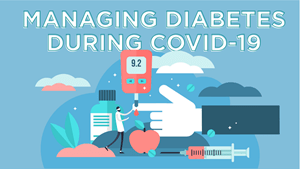
Diabetes patients have been declared at a higher risk for developing severe illness from COVID-19 by the Center for Disease Control and Prevention (CDC). Rochester Regional Health's Michael Quartuccio, MD, is board certified in Endocrinology Diabetes and Metabolism. He tells us how diabetics can manage their diabetes and keep their immune systems performing at their best.
The CDC has determined that patients with diabetes who do get the virus are at a higher risk of developing serious illness from the virus. There is currently not enough evidence to determine whether those with diabetes are more likely to get COVID-19 than the general population.
What we know is that people with poor control of their diabetes are at a higher risk of developing severe illness from COVID-19 once they are infected by it. As of now, there is no evidence that the risks are different for people with type 1 or type 2 diabetes.
We haven’t heard of any kind of shortages of any medication, including insulin. The pharmaceutical company has been in touch with us reassuring us that their supply lines are open.
Call a doctor if you notice warning signs for COVID-19. According to the CDC, those signs include:
1. Difficulty breathing or shortness of breath
2. Persistent pain or pressure in the chest
3. New confusion or inability to arouse
4. Bluish lips or face
For patients with diabetes, contact your diabetes provider if measured sugar levels are persistently elevated above 250mg/dl.
Generally, DKA happens because of some kind of stressor or illness. So, it is possible that people affected by COVID-19 might have a higher rate of DKA.
The best way to avoid this is by keeping good control. Hydrate, take appropriate doses of medication and monitor blood sugar closely and frequently. Taking these measures will reduce the likelihood of developing DKA or any other serious illnesses.
The best option is working from home. If that is not an option, request to be able to physically distance yourself six feet from other employees at all times. If those accommodations can’t be made, talk to an employer or the human resource department about reasonable accommodations to ensure a safe working environment.
1. Monitor diabetes closely
Check glucoses regularly and keep track of them by writing down the information in a table. If sugars are consistently elevated, you should contact your health care provider.
Writing your information down will make it easier to communicate with your provider and help them understand what’s going on.
2. Stock up on food
Be sure to have plenty of canned and frozen fruits and vegetables.
3. Have extra medicine
Ask for any refills as soon as possible.
I recommend that people request 3-month supplies for medications from their providers. To avoid leaving home, switch the medications to home delivery if that is an option.
4. Stay connected to your diabetes provider
Maintain consistent contact with your provider to manage diabetes, especially if sugars are high.
Our offices are offering telehealth visits by either telephone or video chat to help make it easier to control diabetes without needing to go to the office.
Learn more about telehealth services
5. Exercise regularly
Exercise helps keep blood sugar regulated. The American Diabetes Association (ADA) recommends at least 30 minutes of moderate-intensity exercise daily.
Moderate-intensity exercise can be anything from a brisk walk to working out on equipment at home or engaging with exercise videos online. Just because you can’t go to the gym doesn’t mean you can’t exercise.
Keeping up with exercise will help keep diabetes under control and help the heart and lungs stay healthy.
6. Get quality sleep
Do your best to keep a regular sleep schedule. Certain practices to maintain a sleep schedule include meditation, breathing techniques, and avoiding electronics before bed.
7. Cook healthy meals
Now is a good time for people to take the time to cook in a healthier fashion.
The American Diabetes Association offers a lot of great recipes for people with diabetes.
For all patients, including those with diabetes, taking basic measures to prevent the spread of the virus is important.
Here are some additional steps to take:
Everyone should take this situation seriously, but don’t be paralyzed with fear. It’s important to take precautions, but this is something we will get through together. Always be sure to reach out to your healthcare provider with any questions.